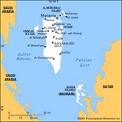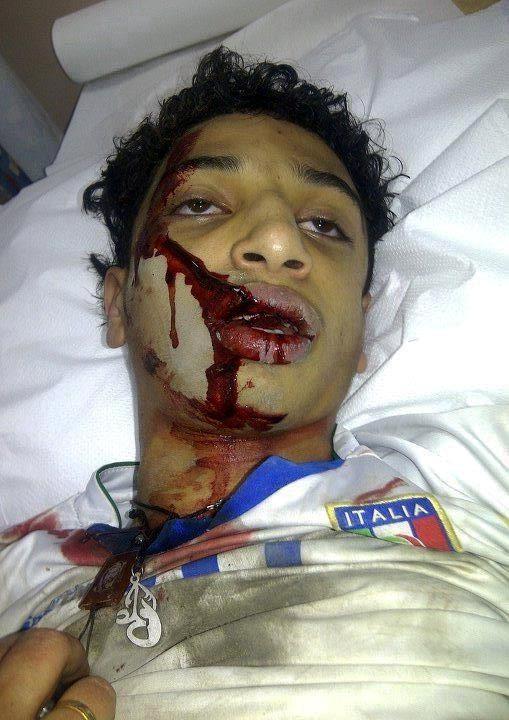Bahrain: US Ally Kills Children… So When Is NATO Intervening?

This is the face of state terror against civilians in the US and British-backed Gulf oil kingdom of Bahrain – the latest victim a boy shot dead by police. But there will be no call by Washington or London for a Libya-style NATO intervention to protect human rights here. No call for regime change. No call for an international crimes tribunal.
Fourteen-year-old Ali Jawad Ahmad was killed on 30 August when Saudi-backed Bahraini riot police fired a tear gas canister at the youth from close range. On the day that was supposed to be a celebratory end to Ramadan – Eid al Fitr – people across Bahrain were shocked by yet another “brutal slaughter of innocents” by the regime and the stoic silence of its Western backers.

The teenager was among a crowd of youths who had gathered in a peaceful protest following morning prayers in the mainly Shia village of Sitra, calling for the overthrow of the unelected Sunni monarchy.
The Bahraini protests against the US and British-backed autocratic rulers have been continuing for nearly seven months despite the military intervention of Saudi Arabia in the Gulf island to crush the pro-democracy movement. Nearly 40 civilians have been killed by state forces since the uprising began in mid-February; thousands more have been injured, imprisoned, tortured or sacked from jobs.
But the relentless repression – condemned by Amnesty International, Human Rights Watch and several other rights groups – has failed to halt the pro-democracy campaign. The resilience of the protesters is all the more remarkable given that their cause has been met with cold indifference from Washington and London, and from much of the mainstream media.
While Western governments have been quick to condemn the rulers of Libya and Syria for alleged human rights violations – launching a full-scale military onslaught on the former and mounting diplomatic sanctions against the latter – these same governments have continued to give full backing to the Al Khalifa dictatorship in Bahrain.
The mainstream media agenda has dutifully followed suit. While the BBC, CNN etc have descended on Libya and Syria to champion the cause of armed rebels with dubious credentials, these same media outlets have virtually ignored Bahrain where the pro-democracy movement is supported by a majority of the population and which has so far remained peaceful in the face of gratuitous state violence.
The latest victim of state terror in Bahrain is at least the sixth person to die from the indiscriminate lethal use of tear gas by Saudi-backed pro-state forces. Ironically, Saudi Arabia and Bahrain, as well as other Gulf sheikhdoms such as Qatar and the United Arab Emirates, have lent diplomatic and military support to NATO’s interventions in Libya and Syria to allegedly defend human rights. Yet these autocrats have been murdering unarmed civilians in Bahrain with impunity and Western imprimatur.
For several weeks since the Bahraini regime’s initiative of so-called “national dialogue” failed to engage opposition groups, there has been a massive stepping up of indiscriminate use of tear gas in villages deemed to be supportive of the mainly Shia-led pro-democracy movement.
Riot police have attacked villages on a daily and nightly basis, firing tear gas into homes. Families have had to flee their dwellings in the middle of the night, sometimes by carrying children out of bedroom windows using ladders. Those unable to move – disabled, sick and elderly – have been trapped indoors during these attacks and some have died from acute exposure to the tear gas. The youngest victim was five-year-old Mohammed Farhan [1].
Pro-democracy sources have labelled the deployment of tear gas as a deliberate tactic of “toxic terrorism”. It is the regime’s way of coercing the opposition groups to enter the dialogue process – which the opposition has dismissed as an empty public relations exercise designed to shore up the status quo of the Al Khalifa dynasty.
It is scarcely believable that Washington or London is unaware of the Bahraini state terror over recent months and in particular the massive, indiscriminate use of tear gas on civilian homes. Bahrain – a former “protectorate” of Britain – has close links between its ministry of interior and British security personnel. The Gulf island is home to the US Navy Fifth Fleet, from where the entire Persian Gulf and Arabian Sea down as far as the coast of Somalia are surveyed. The territory of Bahrain is less than 60 kilometres long and only 17 kilometres wide.
Two of the Bahraini villages that have been subjected to heavy tear gas attack are Ras Rumman and Bilad Al Qadeem where the British and US embassies are located. As one pro-democracy activist commented on being asked about official British and American knowledge of improper tear gas use: “They must smell it everyday coming under their doors.”
But the issue for many Bahrainis is not just mere knowledge, but rather direct approval by Washington and London of what is a state terror tactic against civilians.
They point out that the upsurge in tear gas deployment followed the visit to Bahrain in the beginning of July by Jeffrey Feltman, the US roving ambassador for the Middle East. Feltman, who was previously ambassador to Israel and Lebanon during the Israeli invasion in 2006, was a strong advocate of the Bahraini regime’s national dialogue, urging “all moderates” to participate.
It seems more than conceivable that someone with Feltman’s hawkish credentials would have advised the US Bahraini clients to resort to a more coercive policy if the opposition shunned the talks process.
Feltman has visited Bahrain on at least eight occasions. One of those visits was just before the Saudi-led invasion of Bahrain. “Every time this guy Feltman comes to Bahrain, we see a drastic increase in repression and deterioration in human rights,” said one pro-democracy activist.
At least three US companies have been identified as suppliers of tear gas to Bahrain, including NonLethal Technologies, Combined Systems and Penn Arms, all based in Pennsylvania [2].
More recently, Bahraini sources have noted that newer types of tear gas canisters do not bear the usual manufacturer markings [3]; that the canisters are larger therefore dispensing much more smoke [4]; and that the toxicology is much more potent, causing victims to go into convulsions similar to the symptoms of nerve agents [5].
So, given that the Bahraini regime can kill civilians and children without a murmur from Washington or London, then it is reasonable to conclude that their avowed noble interventions in Libya and Syria are as pungent and as thick as the smokescreens hanging over Bahraini villages.
Finian Cunningham is a Global Research Correspondent based in Belfast, Ireland. He was expelled from Bahrain for his critical journalism on 18 June 2011.
NOTES
[1] Victims of Bahraini state terror, including Mohammed Farhan (5) and other victims of tear gas intoxication:
http://bahrainrights.hopto.org/en/node/3864
[2] Video detailing US suppliers of tear gas to Bahrain:
http://www.youtube.com/watch?v=-0iOYpiR46M&feature=share
[3] Pictures showing newer tear gas canisters with no markings:
http://www.facebook.com/media/set/?set=a.241386425896045.64440.194515507249804&type=1
[3] Video of new, larger tear gas canisters that engulf homes:
https://www.youtube.com/watch?v=lJj6dRPMup4
[5] The more lethal effects of new tear gas causing convulsions in victims:
http://www.youtube.com/watch?v=EypDipIHL7U&feature=share

